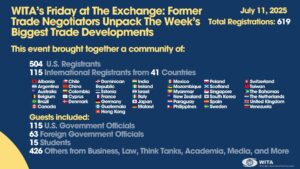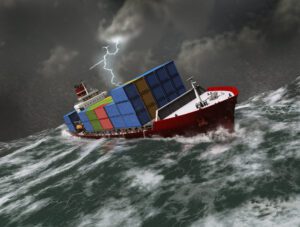WITA’s Friday at The Exchange:
Former Trade Negotiators Unpack this Week’s Trade & Tariff Announcements
On Friday, July 11, WITA convened former trade negotiators to break down the trade and tariff announcements made this week by the White House.
No one understands the dynamics with key U.S. trading partners better than the people who led these kind of difficult trade negotiations for the United States. Panelists updated our viewers on the White House announcements; what remains undone; and what are expected next steps in these trade negotiations.
Featured Speakers:
Wendy Cutler, Vice President, Asia Society Policy Institute; former Acting Deputy U.S. Trade Representative, Office U.S. Trade Representative
Mark Linscott, Senior Advisor, Trade Policy, US-India Strategic Partnership Forum; Senior Advisor, The Asia Group; Non-Resident Senior Fellow, Atlantic Council; former Assistant U.S. Trade Representative for South and Central Asian Affairs, Office U.S. Trade Representative
Daniel Mullaney, Non-Resident Senior Fellow, Atlantic Council; former Assistant U.S. Trade Representative for Europe and the Middle East, Office U.S. Trade Representative
Moderator: Michael Smart, Managing Director, Rock Creek Global Advisors; former Director for International Trade and Investment, National Security Council, The White House; former Trade Counsel, Democratic Staff, U.S. Senate Committee on Finance
07/11/2025 | WITA
Trump’s Trade Wars Expose Chink in Global Economic Order
At the end of last week, US President Donald Trump shook the global economic firmament with yet another aftershock, this time claiming that he would be sending “letters” to about a dozen countries intimating the imposition of tariffs between 10 to 70 per cent. The announcement came days before the 90-day moratorium set in April was to end on 9 July.
Meanwhile, negotiations have resulted only in two deals, with the UK and Vietnam respectively, and an interim agreement with China. The UK deal resulted in lower tariff rates on British automobiles and eliminated tariffs on the UK aerospace industry but the steel and aluminum exports remain outstanding. With Vietnam, the agreement resulted in reduction of tariffs from 46 per cent to 20 per cent, with duty-free access for US goods in return!
Recent negotiations between the US and China have led to both sides lowering tariffs as an interim measure from an all-time high of 145 per cent by the US and 125 per cent by China, with some easing of the chokehold by China on exports of rare earth magnets. So far, no deals have been reached with the EU, Japan or India.
The US-China trade war is at the heart of the tariff war. The US has long chafed at the bit with regard to its trade deficit of nearly $300 billion. China also holds about $1 trillion in US treasury bonds, accounting for a substantial part of the treasury bonds held by foreign entities.
The tariff war unleashed on the global economic order highlights the close linkage between geopolitics and geo-economics today. Countries around the world are also discovering that the private interests of political leaders, political parties and corporates can drive strategic choices and shape national policies. Today, private entrepreneurs and Big Tech are working in tandem with sovereign governments whether in the West or in China. This is not unlike the colonial age in which explorers like Vasco de Gama and Christopher Columbus had the financial and military backing of their sovereigns for their expeditions to distant lands for trade and treasure, with the spoils being equitably shared later with the sovereigns.
Read the Full Opinion Here
07/09/2025 | Sujan Chinoy | Firstpost
Rethinking Special and Differential Treatment at the WTO
As of 2024, World Trade Organisation (WTO) membership comprises 166 countries, with developing nations accounting for over 60 percent. While this suggests greater inclusivity, it remains debatable whether such participation has meaningfully advanced the interests of developing countries. Amidst institutional challenges and limited progress in plurilateral agreements, scholars are increasingly questioning whether developing economies should shoulder greater responsibilities. Simultaneously, the effectiveness of Special and Differential Treatment (S&DT) provisions, originally designed to benefit these economies, has come under growing scrutiny due to their negligible tangible advantages.
Developing Countries’ Concerns with S&DT
S&DT was intended to grant flexibility and preferential treatment to developing nations, recognising their structural vulnerabilities. To the developing faction, S&DT provisions are a non-negotiable right. However, over time, S&DT has become increasingly contentious, as its beneficiaries accrue only minimal assistance, whereas developed nations argue that it is time to phase them out.
Existing provisions under S&DT were classified into six broad categories: measures granting greater market access to products significant to developing countries’ export baskets, safeguarding trade interests, and flexibilities in using trade policy instruments. Three other categories focusing on transition periods, technical assistance, and special provisions for Least Developed Countries (LDCs) have always been widely accepted as essential for supporting development. Transition timelines help developing members adjust to new rules, while technical aid and infrastructure support, though sometimes reluctantly conceded, are generally uncontroversial.
Among the most beneficial S&DT provisions is the Enabling Clause, allowing developing countries to undertake less than full reciprocity in trade commitments. However, the developed faction has recently pushed for greater reciprocity. The Doha Round launched in 2001, mandated the adoption of the Swiss formula by all members for tariff reduction. Although developed members permitted higher coefficients for developing countries, they also insisted that advanced developing nations participate in sectoral initiatives for tariff elimination. This marked a shift from the Uruguay Round, concluded in 1994, during which developed countries made significant non-agricultural tariff reductions without similar pressure on developing nations.
One of the primary challenges with S&DT lies in the vague and non-binding nature of its provisions. The language, such as ‘less than full reciprocity’, lacks precision and fails to offer meaningful protection, leaving room for developed countries to push for commitments from developing countries that are only marginally less onerous than their own.
Read the Full Article Here
07/08/2025 | Nayana Sharma | Observer Research Foundation
Making Sense of the Trade Storm
International trade has always been at the intersection of politics and economics. However, for mid-sized businesses operating across borders it is at the factory gate and in boardrooms. Tariffs are no longer abstract policy instruments. They are direct threats to business viability, eroding margins, disrupting supply chains and turning once reliable trade routes into high-risk ones.
The businesses most exposed to these shifts are not necessarily the largest exporters or global conglomerates. They are the mid-corporate manufacturers, agri-processors and industrial suppliers (commodity traders) with local resilience and global ambition. They are deeply embedded in international supply chains but often too lean to hedge their way out of trouble.
We are entering an era where agility, not scale, will determine survival. And that requires a new kind of financial partnership. Clients are no longer just asking, “Can you fund this transaction?” They’re asking, “Can you help me make sense of what’s happening and what’s coming?” Clients want guidance on structuring deals before exposure; insights into alternative routes and supplier strategies; clarity on regulatory friction points; and an understanding of the ethical implications of origin practices.
Many are navigating the grey area between merchanting and origin washing. The former adds legitimate value through partial processing in a second jurisdiction. The latter involves deliberately rerouting goods through a third country to conceal their true origin and evade higher tariffs, risking violations of customs laws and international trade agreements. Understanding this distinction is not just legal housekeeping; it is critical to maintaining access to global markets.
We are seeing SA [South African] firms explore routing goods through neighbouring countries to reduce tariff exposure. Done right, this can be a sound, compliance-managed strategy. Done poorly, it invites penalties, reputational damage and regulatory scrutiny. That nuance matters.
Read the Full Opinion Here
07/09/2025 | Shane Naidoo | BusinessLIVE. South Africa
WITA – We put the community in trade community.
Information about upcoming WITA and trade community events







